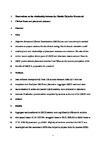Observations on the relationship between the dietetic Objective Structured Clinical Exam and placement outcome.
| dc.contributor.author | Parkin, Tracey | |
| dc.contributor.author | Collinson, Avril | |
| dc.date.accessioned | 2019-03-19T17:31:49Z | |
| dc.date.issued | 2019-04-24 | |
| dc.identifier.issn | 1032-1322 | |
| dc.identifier.uri | http://hdl.handle.net/10026.1/13497 | |
| dc.description.abstract |
Aim Objective structured clinical examinations (OSCEs) are used extensively in medical education to prepare students for the clinical setting. Their use in dietetic education is still relatively new, and relationships to placement outcomes are unknown. The aim of this study was to explore 11 years of OSCE and placement data to answer the following questions: Does the OSCE predict dietetic placement outcome? and, What are the student perceptions of the benefits of OSCE in preparation for practice? Methods Data were collected retrospectively from 328 students between 2006 and 2017 who had completed their final year OSCE and placement. Aggregate OSCE marks and mean marks obtained in active and passive OSCE stations were compared with placement outcome. Evaluation questionnaires completed by students at the end of the OSCE were collated. Results Aggregate marks achieved in OSCE stations were significantly different for students who passed (mean = 63.24, SD = 7.94), struggled (mean = 58.25, SD = 8.82) or failed (mean = 57.31, SD = 8.28) placement, P < 0.001. Majority of students perceived the OSCE as a meaningful and fair assessment (92%) that helped to prepare them for practice (82%). Conclusions The OSCE provides a meaningful assessment of dietetic student skills in preparation for practice. Aggregate OSCE marks provide a consistent indicator of students who are likely to struggle in practice. | |
| dc.language.iso | en | |
| dc.publisher | Wiley | |
| dc.title | Observations on the relationship between the dietetic Objective Structured Clinical Exam and placement outcome. | |
| dc.type | journal-article | |
| plymouth.journal | Nutrition and Dietetics | |
| dc.identifier.doi | 10.1111/1747-0080.12537 | |
| plymouth.organisational-group | /Plymouth | |
| plymouth.organisational-group | /Plymouth/Faculty of Health | |
| plymouth.organisational-group | /Plymouth/REF 2021 Researchers by UoA | |
| plymouth.organisational-group | /Plymouth/REF 2021 Researchers by UoA/UoA03 Allied Health Professions, Dentistry, Nursing and Pharmacy | |
| plymouth.organisational-group | /Plymouth/Research Groups | |
| plymouth.organisational-group | /Plymouth/Research Groups/Institute of Health and Community | |
| plymouth.organisational-group | /Plymouth/Users by role | |
| plymouth.organisational-group | /Plymouth/Users by role/Academics | |
| dcterms.dateAccepted | 2019-03-12 | |
| dc.rights.embargodate | 2020-4-23 | |
| dc.rights.embargoperiod | Not known | |
| rioxxterms.version | Accepted Manuscript | |
| rioxxterms.versionofrecord | 10.1111/1747-0080.12537 | |
| rioxxterms.licenseref.uri | http://www.rioxx.net/licenses/all-rights-reserved | |
| rioxxterms.licenseref.startdate | 2019-04-24 | |
| rioxxterms.type | Journal Article/Review |


